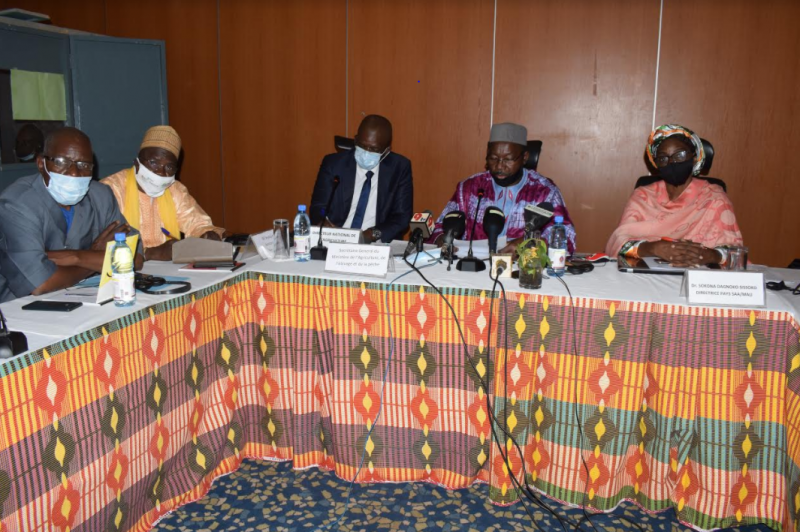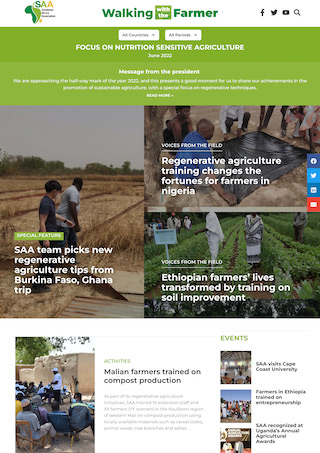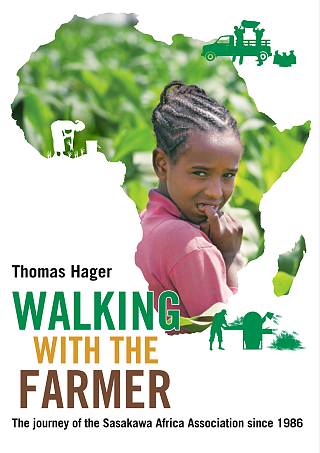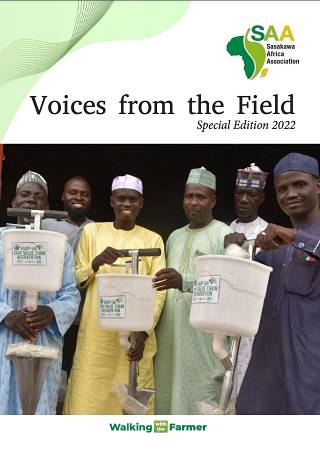PHAP workshop in Mali

Post-Harvest Operations and Agricultural Product Processing workshop was organized by the Sasakawa Africa Association at the Hotel Azalai Bamako from 10 to 11 November 2020 with the theme "Review and Strengthening of the Role of the Management of Harvest, Post-Harvest and Transformation Operations of Agricultural Products in African Food Systems ".
The objective of the workshop was dialogue and exchanges between SAA and participants so that technologies for the management of harvest, post-harvest operations and the processing of agricultural products are communicated to producers with a view to accelerating their adoption to transform agriculture in general and family farming in particular. It also aimed to share information on technologies and practices to reduce post-harvest losses, to produce quality products in order to meet the challenge of food and nutritional security and to improve the incomes of the various stakeholders involved in agricultural value chains.
The Country Director of SAA Mali, Dr. Sokona Dagnoko Sissoko in her intervention stressed out the fact that SAA adopted the strategic plan for the period 2019-2023, the implementation of which is essentially based on the development, the testing, the consolidation and validation of innovative models of agricultural extension to accelerate the transfer and the adoption of technologies by the actors of the value chains. Among these models, she cited the Agro-Processing and Enterprise Center (APEC), Private Providers of Agricultural Extension Services (PSPs), and the Production, Post-Harvest and Trade Center (PHTC). The harvesting, post-harvest and processing technologies of agricultural products introduced by SAA and its main partner which is the National Directorate of Agriculture (DNA) are not an end in themselves, but they must be improved for better adaptation to the needs of producers, said the Country Director of SAA.
Dr. Makoto Kitanaka, the President of SAA, and Mr. Ryoya Tasai from Tokyo (Japan), Dr. Mel Oluoch, the Regional Director, and other thematic Directors from Addis Ababa (Ethiopia) took an active part in the workshop remotely by videoconference.
SAA Regional Director Dr. Mel Oluoch in his remarks underlined that SAA interventions start from the field to the fork along the agricultural value chain. He also stated that SAA is proud to work with the Ministry of Agriculture, Livestock and Fisheries (MALF) through the DNA to facilitate the management of harvest, post-harvest and processing operations of agricultural products in Mali while improving food and nutritional security, incomes and the living conditions of producers.
The President of SAA, Dr. Makoto Kitanaka, indicated that the holding of this workshop is a good opportunity for Mali to review the great achievements made and the challenges encountered during the introduction of post-harvest and processing technologies of agricultural products from 2010 to the present day. He also said that SAA interventions from 1996 to the present have reached more than 60,000 small producers and with DNA, ICRISAT, IFDC, AGRA, PAM, and JICA as main partners (among others) through the Empowerment of Small Horticultural Producers or the Market Oriented Agriculture Approach (SHEP), etc. Before ending his speech, Dr Makoto Kitanaka mentioned that the COVID-19 impact mitigation pilot project on the food and nutritional system through the e-Extension will truly initiate agricultural digitalization in Mali.
The Secretary General of the Ministry of Agriculture, Livestock and Fisheries Mr. Lassine Dembélé representing the Minister underlined in his opening speech in the presence of the National Director of Agriculture Mr. Oumar Tamboura, some salient results obtained by SAA from production to marketing, including the introduction of harvesting and post-harvest equipment and technologies, and the processing of agricultural products, which has reduced post-harvest losses by approximately 20%. This qualitative transformation has resulted in a substantial improvement in agricultural competitiveness and a consequent increase in the incomes of smallholder farmers.
The proceedings of the workshop were sanctioned by a press release with the following highlights:
• There is need for data to assess post-harvest losses as a whole. For this, we need to put in place loss estimation systems to measure or evaluate them objectively, "it is difficult to manage what is not measured".
• The scale and the economic and social costs resulting from post-harvest losses constitute major challenges for the development of agriculture and the rural world and major obstacles to food and nutritional security in Mali
• The management of post-harvest losses requires the transformation of food systems, since their inefficiency is one of the main causes that contribute to this problem
• The updating of statistical data on agricultural mechanization in Mali is urgent and necessary.
• Government and development partners are called upon to promote the scaling up of affordable post-harvest technologies to enable smallholders, traders and agro-processors to benefit. Simple, affordable and accessible technical solutions should be identified and promoted by capitalizing on the promotion of communities of practice that facilitate access to knowledge at the local level.
• The wish to see SAA more involved in agricultural learning centers and universities in the management of harvest and post-harvest operations and the processing of agricultural products
• Data on the status of mechanization per crop will help boost the development of the sector in Mali
• The need to validate the national agriculture mechanization strategy in Mali is becoming more essential than ever.
• The challenges relating to equipment can be summed up in their high cost, poor maintenance and non-certification before use (urgent need to have a certification center for harvesting, post-harvest and processing equipment of agricultural products in Mali).
• The need to organize an agricultural mechanization day in Mali.
• Updating and validation of the national agricultural mechanization strategy in Mali
• The study on the adoption rate and quality of harvesting and post-harvesting, processing equipment and technologies for agricultural products is of paramount importance
• Taking into account the nutrition of rural households in our programs as well as online training on good practices in the management of harvest and post-harvest operations and the processing of agricultural products
The workshop was closed by Mr. Keita Seydou of the Ministry of Agriculture, Livestock and Fisheries after the adoption of the communiqué subject to the comments which will be taken into account.
SAA Publications

E-newsletter
"Walking with the Farmer"
SAA publishes a bimonthly e-newsletter reporting on SAA activities.

SAA history book
"Walking with the Farmer: The journey of the Sasakawa Africa Assoication since 1986"
This book chronicles the history of SAA from its inception to the present.

Success stories
Voices from the Field Special Edition 2022
This is a special edition of the "Voices from the Field" articles.




